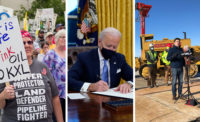Problems with Keystone XL Pipeline's Southern Leg Are Cited
Public Citizen bases its conclusions on its own investigation and copies of warning letters it obtained from the Pipeline and Hazardous Materials Safety Administration.
PHMSA sent the originals to the project's developer, Alberta-based TransCanada, in September 2013.
In a Sept. 26 letter, PHMSA says, "TransCanada experienced a high weld rejection rate" on a pipeline section. The communication notes that 205 of 425 welds, or 48.2%, required repairs.
PHMSA also identified dents and other anomalies in the pipes. "If there were 205 weld problems in a single section, there could be hundreds more in the rest of the 485 miles of the southern segment," said Tom "Smitty" Smith, director of Public Citizen's Texas office, in a Nov. 19 statement.
However, Davis Sheremata, a spokesman for TransCanada, disagrees. The company's voluntary investigative digs revealed dents and anomalies, which are "a sign that our inspection programs work," he says, adding that "inspecting and testing is a critical part of what we do before a single drop of oil goes into a pipeline that we operate." He says any problems will be fixed before operations begin.
The criticism comes at a crucial time. The Keystone XL pipeline's longer, northern section, from Alberta's oil sands to Oklahoma, is under heightened scrutiny. Environmental groups oppose the project, while union and industry groups support it, saying it will provide jobs.
The Obama administration's decision as to whether the project will go forward is not expected until some time in early 2014.



